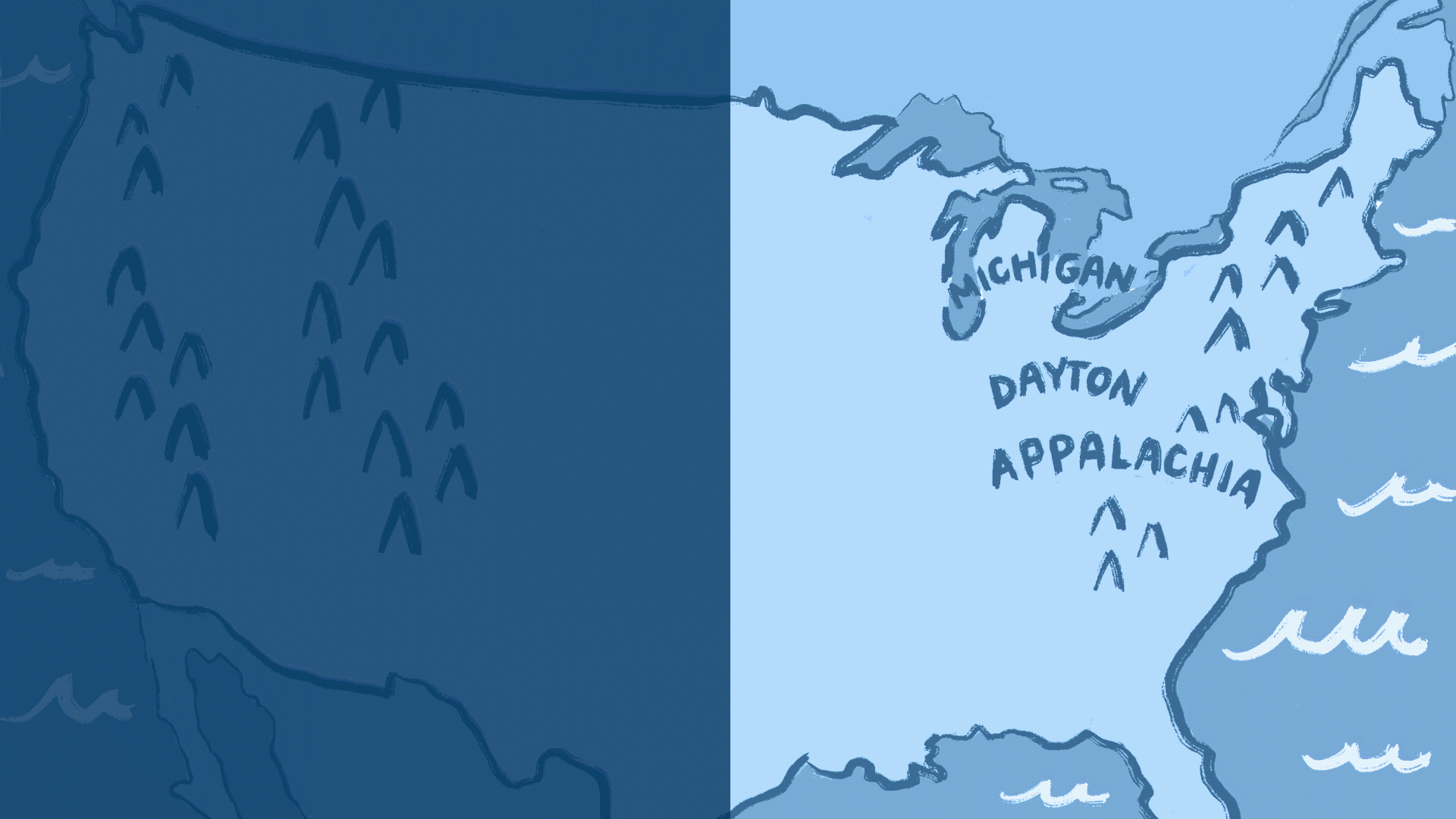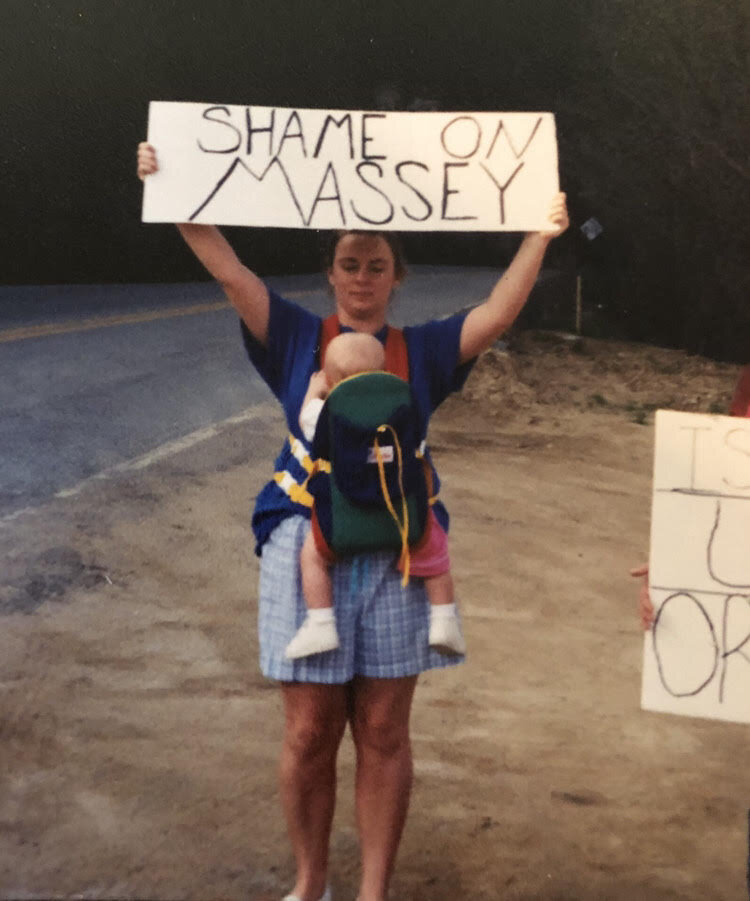
Barbi Ann Maynard, a lifelong resident of Martin County, KY, began fighting for clean water when she became pregnant with her first child. Following her mother’s passing of brain cancer at the young age of 50, Barbi Ann refused to accept a similar fate of being poisoned by the local water. She wanted to ensure a healthier future for not only her daughter, but for the rest of the citizens of Martin County. As Barbi Ann said “A lot of people say, if a little girl from Martin County can be heard around the world, there's hope for all of us.” Barbi Ann has fought tirelessly against the local, state and federal governments, the coal companies, and the school board to bring the people of Martin County safe and affordable drinking water.
Martin County Water Warriors
Personal Twitter

More than 2,000,000 people in the United States live without access to safe drinking water and sanitation.
© Glenna Jennings
The story of Flint is the story of a kind of democracy being taken away. People's protests were loud but they were being silenced,” said Dr. Mona Hanna-Attisha. Dr. Hanna-Attisha is a public health expert, pediatrician, and activist whose research exposed the Flint water crisis in 2015. She has testified in front of the United States Congress twice for her work to expose the elevated lead levels in children, following the switch of the city’s water source from Detroit’s waterline to the Flint River. “This environmental injustice existed widely long before Flint. The reality is that minorities are disproportionately impacted by these calamities,” said Dr. Hanna-Attisha.
Personal Website

More than 44 million Americans are currently being served water from systems that have recently had health-based Safe Drinking Water Act violations.
Mine safety, health and environmental specialist, Jack Spadero has a 38 year career safeguarding people from environmental and health and safety hazards related to mining. Spadero began his career in mining engineering where he was one of the first officials on the scene after the fatal Buffalo Creek flood. Later in his career, he worked in Martin County, Kentucky investigating the 2000 coal slurry spill, where he eventually lost his job for refusing to accept a corrupt investigative report. “l had looked at the dams and said ‘these are unsafe’ but no one did anything about it. If I can help it, I'm not ever going to let anything like this happen again. If I lose my job, well that's okay,” Spadero said. He now resides in West Virginia where he continues to fight for environmental justice
Personal Website

91 percent of U.S. coal-fired power plants with monitoring data are contaminating groundwater with unsafe levels of toxic pollutants.
Grassroots Fundraiser and Co-founder of Flint Rising, Gina Luster has worked to expose the deadly results of failed democracy, environmental racism, and the suffering of lower income communities. Luster has strived relentlessly to advocate for the people of Flint and to fight for life-long justice. “Is there any safe level of lead? Are there any safe levels of Legionnaires? No. I always tell people that every single pipe inside of our homes, businesses, and schools should be replaced until all are completely safe--an entire infrastructure overhaul.” Since the beginning of the crisis, Luster and her young daughter have worked tirelessly to distribute water bottles, filters and information about the dangers of the water to the people of Flint.
Flint Rising

© Garrett Mcclean
© Garrett Mcclean
Average cost of water in Flint per year is $864.
© Garrett Mcclean
Joanne Golden-Hill was born on the highest mountain of Kentucky overlooking the hills of Appalachia. Her family has always called this area home. A nurse by trade, Golden-Hill observed the negative health effects caused by living near coal mines. But her real awakening to activism was when her family’s cemetery was set to be demolished by a nearby coal company. She began working to persuade the coal company not to demolish it. Golden-Hill explains that, “When we first started [people] said yeah we’ve been trying to get something done for over a decade. Good luck. And we thought, right, then okay, but we won’t stop fighting.” Since then, she has continued to challenge the coal company and to work for environmental justice by testing the waters in Kentucky. Her mission is clean water for all Appalachians.
Appalachian Way Photography

If you buy water bottles in bulk for drinking water you will spend close to $1,263 a year.
Monica Lewis-Patrick, aka the Water Warrior, is a human rights advocate, entrepreneur and educator based in Detroit, MI. President and CEO of We the People of Detroit, Monica has worked tirelessly to distribute water and advocate for sustainable water access following the mass water shutoff in Detroit in 2014. In regards to the mass shut off in Detroit, Monica said “It doesn't matter that we helped build the middle class and it doesn't matter if we put the world on wheels, doesn't matter the contributions to labor, art and music, they are fully prepared to let us die.” Mama Monica realized her call to be an activist at a young age and has worked to elevate marginalized peoples and to work for the human right to water for all.
wethepeopleofdetroit.com

On a per capita basis, from 1977 to 2014, federal spending on water infrastructure fell from $76 per person to only $11 per person.
Nina McCoy is a retired biology teacher, now spending her days fighting for clean water for the citizens of Martin County, Kentucky. McCoy grew up as a self-proclaimed “Navy Brat” moving all around the country, but Martin County was always home for her. She got involved with the fight for water after the 2000 slurry spill contaminated the Tugg River. She grew up playing in the Tugg River at her grandmother’s home. “I got involved in the fight for clean water when I saw that we were being treated as if we didn’t have enough sense to realize what was going on,” stated McCoy. Since then, she has been active as the “token environmentalist” in Martin County, gathering citizens to attend water board meetings and fight coal companies. She uses her teaching skills to help school children test their own water and organize creek cleanups.
Martin County Concerned Citizens

Today, women around the world will spend a collective 200 million hours collecting water.
Art Reyes III, a Flint native, grew up on the United Auto Workers picket lines with his family where he first realized the power of activism. Following the announcement of a State of Emergency in Flint, Reyes rushed from Boston to Flint to assist a friend in need. In just two days, he created a coalition of 80 volunteers who worked to help those who were unable to receive water donations and to raise awareness of the most effective ways to deal with the crisis. Reyes is the founding Executive Director of We the People and a founding member of Flint Rising. He said that “This emergency was not a policy mistake or an election that went wrong, and certainly not a natural disaster. This was a crisis of power and they [the government] didn't give a shit about it, about folks in Flint.”
We the People of Michigan

© Garrett Mcclean
© Garrett Mcclean
State and local governments bear the burden of 96 percent of all public spending on water and wastewater utilities.
© Garrett Mcclean
Karan Ireland, a West Virginian environmental lobbyist, currently works for the Sierra Club. In 2014, Ireland was affected by a chemical leak that contaminated the water in Charleston, West Virginia. At that time, she stated, “It's important for people who care about things like whether or not they're able to get a glass of water from their tap, to understand that there's an opportunity for them to be involved." With over 300,000 people affected by the leak, Ireland felt the call to become an environmental activist. She explains that “There's something powerful about a mom coming to her legislature and asking, “What are you doing here because my kids are being affected?”
Personal Twitter

© Glenna Jennings
© Glenna Jennings
The average American family spends about $474 each year on water and sewage charges.
Born in Flint, Michigan, Nayyirah Shariff was raised by two activists instilling in her the desire to “stand up and speak up for injustices.” An engineer by trade, Shariff has been a longtime community organizer, activist, and volunteer in Michigan. Following the Flint Water Crisis, She co-founded the Flint Democracy Defense League, a grassroots group formed to confront the installation of Flint’s un-elected emergency manager in 2011. “My work with the water crisis actually began with a democracy crisis.” She immediately connected the water crisis to the lack of democracy, Shariff is the current director of Flint Rising, a coalition of Flint residents and community groups, labor, and progressive allies that formed in response the overlapping crises.
Flint Rising

© James fassinger
More substantial improvements in the governance, transparency, and sustainability of water supplies are achieved when men and women are involved in equal measure than when women are involved only marginally or not at all.
© Garrett Mcclean
© Garrett Mcclean
Teri Blanton is a water activist located in Eastern Kentucky. She has always been involved with this issue, as she had grown up watching coal companies strip mine behind her home. After living with the effects of strip mining and contaminated water for years, she finally decided to do something about it. “Any way that you can fight for clean water and hold those accountable for despoiling it, is the right thing to do,” said Blanton. She has been fighting for water rights for over 30 years, by talking to both local and federal government officials, working against both strip mining and coal companies contaminating the water.

© Glenna Jennings
© Glenna Jennings
More than 30 million Americans lived in areas where water systems violated safety rules at the beginning of last year, according to data from the Environmental Protection Agency.
Reverend Bill Wylie-Kellermann is a non-violent community activist, author, teacher, and retired United Methodist pastor in Detroit. A native Detroiter, he gained national attention when he and a group that became known as the “Homich 9” were prosecuted for blocking water shut-off trucks in the Detroit Water Struggle. He was later acquitted. “So much of the theology of water is based on the idea that it is a free gift from heaven. It falls on the just and the unjust.... and in that sense, it belongs to everyone.” Wylie-Kellermann now serves as a direct action point person for the Michigan Poor People's campaign.
Personal Website






































